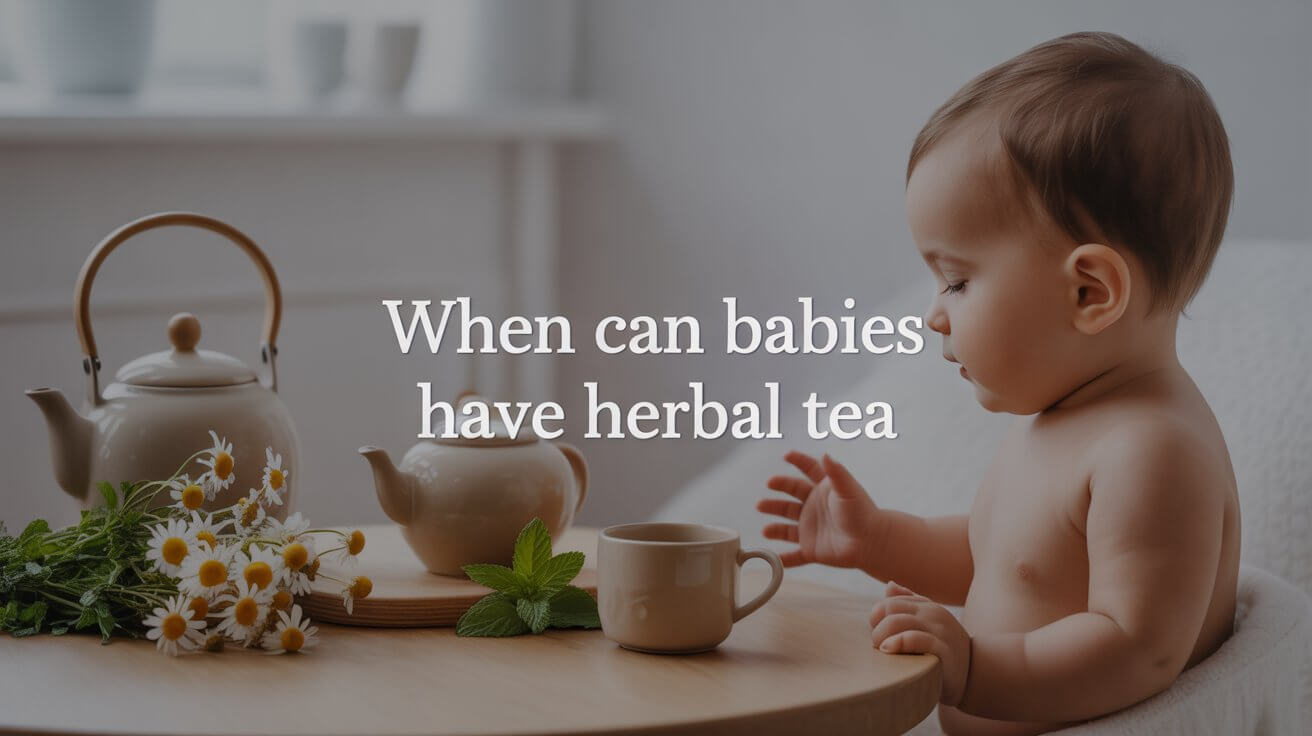Herbal teas like chamomile, peppermint, and fennel are praised for their calming and digestive benefits in adults. But when it comes to infants, parents often ask: “When can babies have herbal tea safely?”
As of 2025, pediatric research remains clear newborns and infants under six months should not be given herbal tea. Their digestive systems are still developing, and any drink other than breast milk or formula can interfere with essential growth and nutrient absorption.
Let’s explore why herbal tea isn’t safe early on, what risks it may carry, and when if ever it might be appropriate to introduce it under medical guidance.
Why Babies Should Avoid Herbal Tea in Early Months
During the first six months of life, your baby’s body depends entirely on breast milk or infant formula for nutrition, hydration, and immune protection. These provide the exact balance of fats, proteins, and antibodies necessary for healthy development.
Introducing herbal tea too early can:
-
Displace vital calories needed for growth.
-
Upset delicate digestion, leading to gas or diarrhea.
-
Interfere with nutrient absorption, particularly iron and calcium.
-
Expose babies to unregulated ingredients or contaminants.
Unlike formula, herbal teas are not standardized or FDA-regulated, meaning even caffeine-free blends can contain trace stimulants, bacteria, or pesticide residues. This lack of consistency makes them unsafe for infants.
Potential Risks of Giving Babies Herbal Tea
Parents sometimes consider herbal tea as a “natural remedy” for colic or teething discomfort. However, even mild herbs can cause unintended side effects.
Common risks include:
-
Allergic reactions: Sensitive babies may react to certain plants like chamomile or fennel.
-
Digestive irritation: Herbs such as peppermint can relax the esophageal sphincter, worsening reflux.
-
Mineral interference: Tannins in tea can inhibit iron absorption.
-
Hidden caffeine content: Even trace caffeine can overstimulate a baby’s nervous system.
-
Sugar exposure: Some store-bought teas include sweeteners or honey, which are unsafe for infants under 1 year.
When Might Herbal Tea Be Considered Safe?
After six months, babies can begin sipping small amounts of water with meals but even then, herbal teas should only be introduced under pediatric supervision.
If approved by your doctor, mild, caffeine-free teas like chamomile or fennel may occasionally help soothe gas or mild colic in older babies (closer to 12 months).
Here’s a general comparison chart to help visualize safety and timing:
| Baby Age | Safe Beverages | Herbal Tea Recommendation |
|---|---|---|
| 0–6 months | Breast milk or formula only | ❌ Not safe |
| 6–12 months | Breast milk, formula, small sips of water | ⚠️ Only with pediatrician approval |
| 12+ months | Milk, water, very mild herbal infusions | ✅ Small amounts may be allowed |
Important: Herbal tea should never replace milk, water, or meals. Offer only a few sips at a time not full cups.
People Also Ask: Common Baby Tea Questions
Can babies have chamomile tea for sleep?
Chamomile is calming, but infants under 12 months should avoid it unless prescribed by a doctor. Some studies (2024, Journal of Pediatric Health Care) found potential benefits for older toddlers, but early introduction poses allergy and contamination risks.
Is fennel tea good for colic?
Fennel has long been used for digestive comfort, but experts caution against unsupervised use in babies. There’s limited clinical evidence confirming safety, and dosage can vary widely between brands.
Can herbal teas cause allergies in babies?
Yes. Herbs like chamomile and echinacea belong to the daisy family, which may trigger allergic reactions especially in babies with eczema or food sensitivities.
Safe and Natural Alternatives to Herbal Tea for Babies
If your baby struggles with gas, constipation, or sleep, there are safer, pediatric-approved solutions:
✅ Breast milk or formula – still the best nutrition source under 12 months.
✅ Small amounts of water (after 6 months) – helps with hydration and digestion.
✅ Tummy massages or warm compresses – soothe gas and colic naturally.
✅ Gentle probiotics (pediatric-approved) – support gut health in older infants.
✅ Fruit purees or diluted fruit water (after solids begin) – introduce mild flavors safely.
Modeling Healthy Habits as Parents
As your baby grows, they’ll mirror your choices. Parents who prioritize natural, low-sugar beverages set an early example for healthy living.
Many adults manage sugar cravings or support clean eating with herbal teas designed for metabolism and appetite control such as All Day Slimming Tea or blends with ginger and cinnamon.
By focusing on your wellness while keeping baby-safe boundaries, you foster a home where both parent and child thrive naturally.
Expert Pediatric Recommendations (2025 Update)
Leading authorities including the American Academy of Pediatrics, World Health Organization, and European Society for Pediatric Nutrition agree on the following:
-
No herbal teas or flavored drinks before 6 months.
-
Gradual introduction of water after 6 months.
-
Herbal teas only with medical guidance and in small amounts after 12 months.
Because every child’s health and tolerance differ, always consult your pediatrician before introducing any herbal preparation, even natural ones.
Final Thoughts: When Can Babies Have Herbal Tea?
The safest answer remains:
Not before six months and ideally, not until after the first year, with your doctor’s approval.
Herbal tea for babies may sound gentle and natural, but it carries risks that outweigh any potential benefit. Instead, focus on breast milk, formula, and water during infancy, while modeling healthy beverage choices yourself.


Leave a Reply